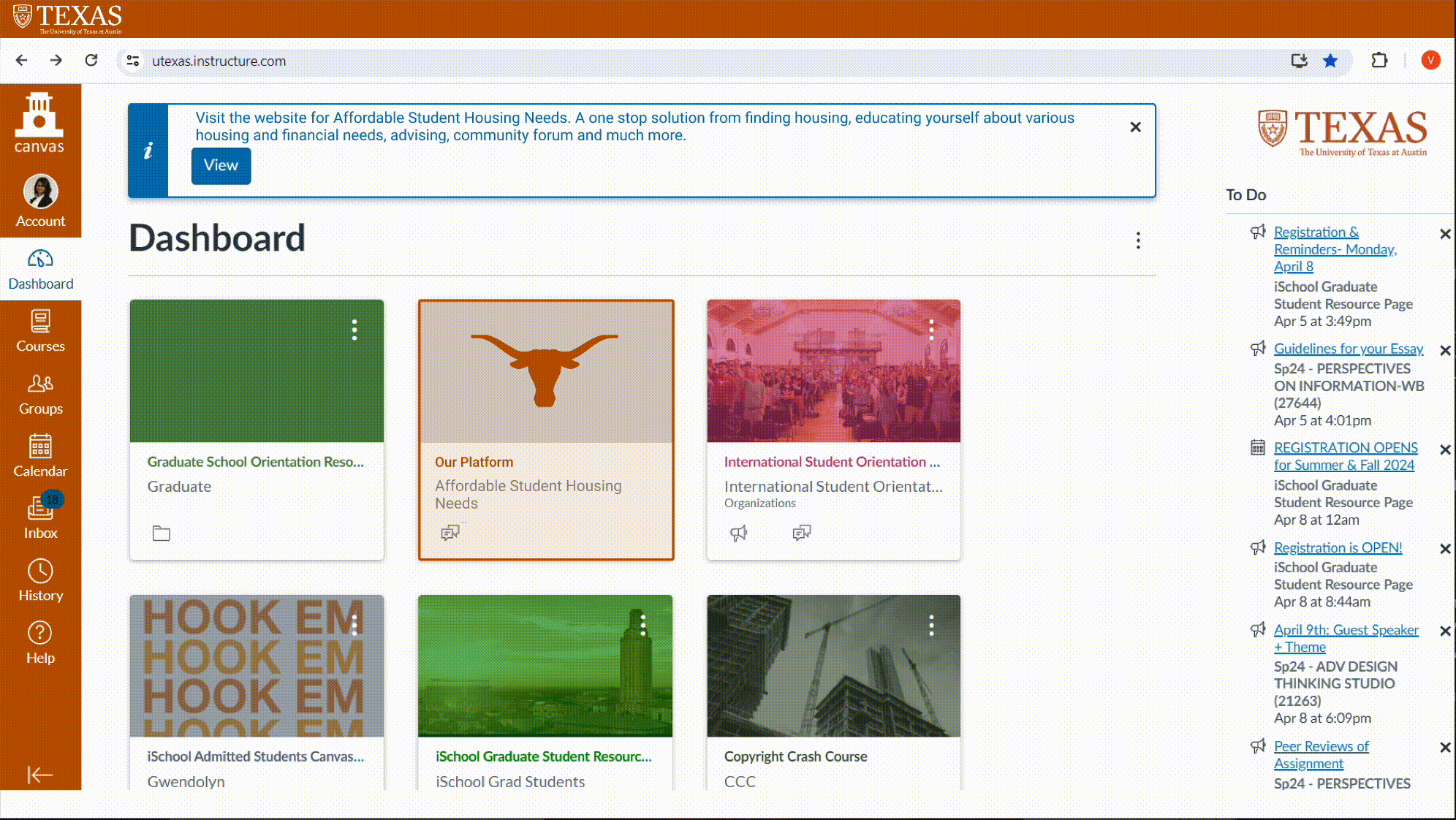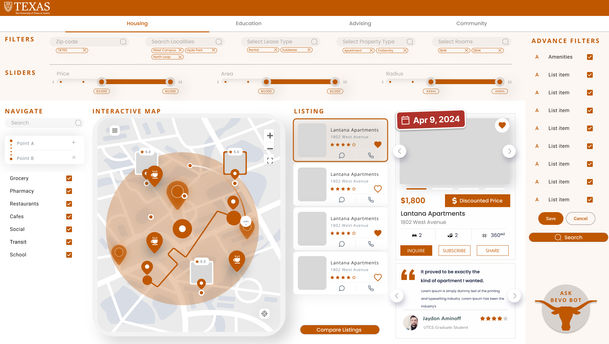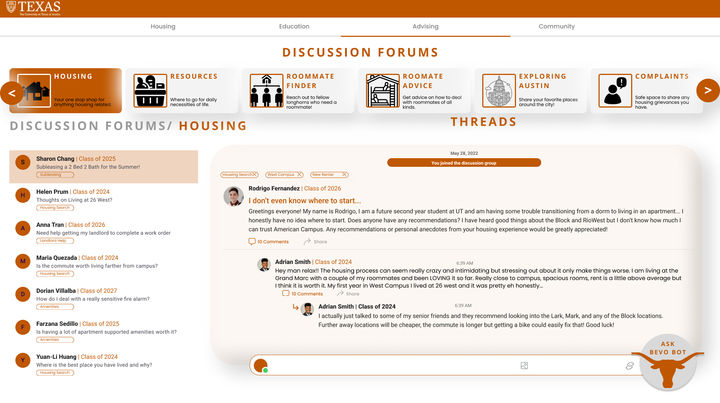Hooked Into Housing
Combining Housing Access & Education to Empower Student Renters
UT’s premier all-encompassing housing support platform. The confusing and stressful housing search process has plagued the UT student community for too long. Combining accessibility and education, Hooked Into Housing seeks to prepare Longhorns for their housing present and future.

Overview
PREPARED FOR: IBM Advanced Design Studio
ROLES: Research, Ideation, Lo-fi and Hi-fi Prototyping, and Presentation
CHALLENGE: Find a solution to the Austin Housing Crisis while also fostering community development.
PARTNER: Varsha Revandkar
TIME FRAME: Jan. 2024-May 2024
SOLUTION: A comprehensive online platform exclusive to University of Texas at Austin students combining housing access and education and promoting inter-student communication
“Design a solution to address the affordable housing crisis in Austin while fostering community development. Consider sustainable and inclusive solutions that accommodate the city's rapid growth and diverse socio-economic needs.”
Introduction
Low Affordability, Low Supply, and Low Buyer Leverage
49%
Austin renters considered to be "cost burdened"
23
# of affordable homes available per 100 renters in Austin
$2,347
Average rent per unit for UT student housing
The current state of the Austin housing crisis is in disarray. Austin has an overabundance of middle and high-income housing and a massive deficit in low-income housing. Households earning (between $35,051 - $70,080 annually in the City of Austin have the greatest need for new housing due to an estimated 22.0% undersupply of housing. While this is scary, the area surrounding UT campus is even worse. The consistent high demand creates monopolized market where students accept increasing rent prices by the market taking advantage of their desperation. Cost per sq. foot for student housing is $0.76 more on average than the rest of Austin. Students feel lost, frustrated, and powerless to make any change because they do not even know where to start.
User Research
Understanding the Student Housing Experience
We conducted 7 user interviews based on the following relevant parameters:
Living Situation
Resources
Affordability
Space Needs
Shared Space
Safety & Security
Transportation
Livability
Community
Accessibility
INSIGHTFUL USER QUOTES
"Even my dad who knows plenty about it, and he pretty much gave up too and he was like, whatever, just sign your lease and let me know"
"Living in Austin near campus, it felt like a true community like it was people my age who might interest I was working there."
"College students need to access the resources to find affordable housing so they spend their free time building community versus working"
"We looked at a bunch of places and then very quickly decided on Grand Mark and signed a lease because we were in a hurry to lock in at a lower price. So it was rushed, for sure."
"Being in the same place and going to the same shops and seeing the same people and feeling stable really, really positively contributed to the like my perceived ability to find connections with other people."
Based on the evaluation of our secondary research we developed 3 main personas:

Jay Sharma
International Student

Maya Thompson-Rodriguez
Undergraduate Student with a Part-Time Job

Kevin Nguyen
Freshly Graduated Student
PERSONA PROFILE AND JOURNEY MAP
PROFILE INSIGHTS

-
Students often lack financial literacy
-
Students are desensitized to extremely competitive and expensive housing market
-
Balancing work and school to afford housing is tough
-
Necessity to be in close proximity to campus limits options
-
Does not need a massive space but needs to feel comfortable
MAP INSIGHTS

-
Lack of options became an especially frustrating point
-
Limited time created a lot of stress to make a decision
-
High prices felt unavoidable
-
Assistance and encouragement helped motivate her
-
Access to resources helped her find sufficient options
-
She needed outside help to better understand the market
COMMON THEMES FOUND IN RESEARCH
Through analysis of our research, we found that there is a fundamental sense of powerlessness due to lack of access to proper resources like transportation on and off campus, community guidance, and affordable listings. These themes and pain points informed our student-centered ideation process by exposing underlying continuous issues that plague students during the housing process
AFFORDABILITY

-
Spending a significant portion of income on housing
-
Financial strain due to unexpected expenses
-
Limited financial support and resources
-
Perception of housing as an investment despite high costs
RESOURCES

-
Difficulty accessing housing information due to limited availability and time constraints
-
Limited financial literacy influencing housing decisions
-
Oversaturation of housing options making decisions challenging
COMMUNITY

-
Desire for a stronger sense of community and inclusive environment
-
Challenges with socialization and community involvement due to circumstances
-
Limited access to community resources and initiatives
Ideation
Translating Insights into Action
Maya, an undergraduate student with a part time job, is frustrated with finding the right housing due to inaccesibility of adequate resources, poor financial literacy, and lack of unbiased assistance. She needs a tool to simplify the housing process and build financial literacy for her future.
Our design must...
Provide students concrete tools that will ease the difficulty in finding affordable housing.
Encourage students to become financially literate, for their present and future financial health.
Connect students together around their shared experience to create a network of trust and support


FROM TWO MAIN PROBLEMS TO FOUR ACTIONABLE SOLUTIONS

Financial Literacy

Financial Education

Targeted Student Advising
Housing Access
Student Resource Access
Inter-Student Communication
Prototyping
Building the Tools for Student Renter Success
After our comprehensive ideation, wanted to develop a specific tool for each of the four main insights we developed. We conducted a comprehensive prototyping concept that included simple sketches, lo-fi digital prototypes, and polished hi-fi prototypes. Gaining feedback and iterating throughout the process, we wanted to ensure each feature gave justice to the intention of our prompt, while also being rooted in our research.
INTERACTIVE MAP
This feature is a comprehensive map that goes beyond just available housing. We found there are many other factors that go into a housing decision and tried to include as many details as possible. We wanted students to feel like they had a well rounded understanding of available opportunities according to livability that is connected to the community, rather than just the housing unit itself.
LOW-FI


HIGH-FI

PAIN POINTS ADRESSED
-
Student renters are often first time renters and those with limited financial literacy.
-
The over-saturation of renters in need of housing near campus creates waitlists that require quick, opportunistic and ill-informed decision making to secure housing.
-
Students have difficulties accounting for unexpected expenses that could seriously affect their financial future if not prepared.
SOLUTIONS
-
The interactive module-based learning process keeps students engaged while informing about relevant information.
-
The curriculum is heavily focused on housing-related topics to specialize relevant information.
-
The curriculum accounts for more general financial topic indirectly related to the housing experience, which provides basic knowledge of personal finances
-
Upon completion of the full curriculum students will receive an official UT housing literacy badge that can be added to a resume or Linkedin profile.
EDUCATIONAL MODULES
This feature heavily focuses on building student financial literacy specifically as it relates to housing. The educational modules take students through a variety of housing topics that will better prepare them as they search for their own housing. Building knowledge through both education and experience helps reinforce better practices and confidence amongst students to help them tackle their housing present and future.
LOW-FI


HIGH-FI

PAIN POINTS ADRESSED
-
Student renters are often first time renters and those with limited financial literacy.
-
The over-saturation of renters in need of housing near campus creates waitlists that require quick, opportunistic and ill-informed decision making to secure housing.
-
Students have difficulties accounting for unexpected expenses that could seriously affect their financial future if not prepared.
SOLUTIONS
-
The interactive module-based learning process keeps students engaged while informing about relevant information.
-
The curriculum is heavily focused on housing-related topics to specialize relevant information.
-
The curriculum accounts for more general financial topic indirectly related to the housing experience, which provides basic knowledge of personal finances
-
Upon completion of the full curriculum students will receive an official UT housing literacy badge that can be added to a resume or Linkedin profile.
ADVISING
This feature provides scheduling opportunities with an official university advisor specialized to assist with the housing process. We provide targeted advising opportunities based on the needs of each student. Consideration for all stakeholders in the process whether it be family, roommates, or the student themselves is important in ensuring a well-thought out calculated decision that renters can be confident in.
LOW-FI


HIGH-FI

PAIN POINTS ADRESSED
-
Weak roommate communication and goal misalignment inhibits collective eager compromise.
-
Parents that are financially responsible for their child's housing are often not involved in the housing search process.
-
There is limited access to unbiased general housing resources and information.
SOLUTIONS
-
Specialized family-based advising appointments involve parents directly in the housing search process and provide essential resources.
-
The University advising program gives students a more unbiased perspective that is invested in their success.
-
Specialized group advising is mainly tailored to roommates who need advice and guidance toward an involved compromise on their best housing option.
-
1-on1 advising helps address specific needs of students on an individualized level of attention.
-
Students will be sent a pre-meeting form to give context on their situation to advisors.
COMMUNITY
This feature has created a space for inter-student communication and interaction. Themed discussion forums help students find advice, ask questions, read first hand experiences from their fellow UT students. Discussion threads allow students to directly communicate with each other, building camaraderie and community around the shared experience with student housing.
LOW-FI



HIGH-FI

PAIN POINTS ADRESSED
-
Poor inter-student communication perpetuates feelings of isolation from other students in the community that shares their struggle.
-
The monopolistic nature of housing around UT has created a lack of trust in the housing market among student renters.
-
Students do not feel like they can reach out to others for help.
-
The transient nature of student housing brings challenges with building and sustaining community
-
There is a lack of access to student perspectives on the housing market when searching.
SOLUTIONS
-
Only UT students have access to this platform via SSO.
-
The comment thread feature facilitates direct student-to-student interaction, building community around a shared issue.
-
Anecdotal first hand student information shared on the platform is more trustworthy.
-
Students have a space to freely speak their frustrations with the housing search process.
-
Shareable posts allow students to share the resource to others and spread access.
Feedback
We conducted in-depth interviews with 7 university students, navigating the platform's user interface and receiving perspective feedback:
"You don't know competitive pricing until you see it"
"This gives students a more raw understanding of the market"
"This cuts down so much time for finding a place!"
Students felt the platform gave them a more equitable understanding of both the UT housing marketplace, but also of approaching the housing process in general. Students felt they were better able to learn from their experience through the tools provided by Hooked Into Housing. Students felt more comfortable and confident in their ability to find housing that works for them through Hooked Into Housing.
Next Steps
USER TESTING
We will conduct further user testing to find pain points in our prototype to further iterate our platform.
FINANCIAL LITERACY BADGE
Upon completion of the educational modules, we hope to partner with University Federal Credit Union to reward students with an official financial literacy badge. Students would be able to add the badge as a credential on their resume and Linkedin.
STAKEHOLDER DISCUSSION
Our partnership with the University of Texas at Austin would be essential and includes in depth collaboration on insights and goals.
Reflection
MAJOR TAKEAWAYS
Private university housing companies exploit the oversupply of student renters, low financial literacy, and a rising housing market.
The combination of enhanced housing availability and strong financial literacy education can help ease immediate housing grievances while building skills for the future.
University students trust each other much more than people expect, and their connections through shared experiences can create a more involved effort to improve housing market conditions.
Throughout this semester long project I learned many things about the UT housing market, the design thinking process, UX Design, and more. It was very validating to create a fully realized product that can legitimately contribute positively to people's lives. As a renter in West Campus, I understand the struggle first hand. However, studying the situation in a macroscopic perspective was honestly saddening and scary. The housing market is monopolized and manipulated for the benefit of companies that own 6 or 7 apartment chains. This abusive system has desensitized students to accept their housing circumstance as an unavoidable monetary sacrifice in pursuit of a UT degree. This central realization gave me more perspective on the way students are treated, and that fixing the housing crisis starts with fighting large corporations and companies that maintain a strong hold over residential spaces. Moving forward, I hope to further explore this topic in my education and career, and to help others to come to the conclusion found in this project.